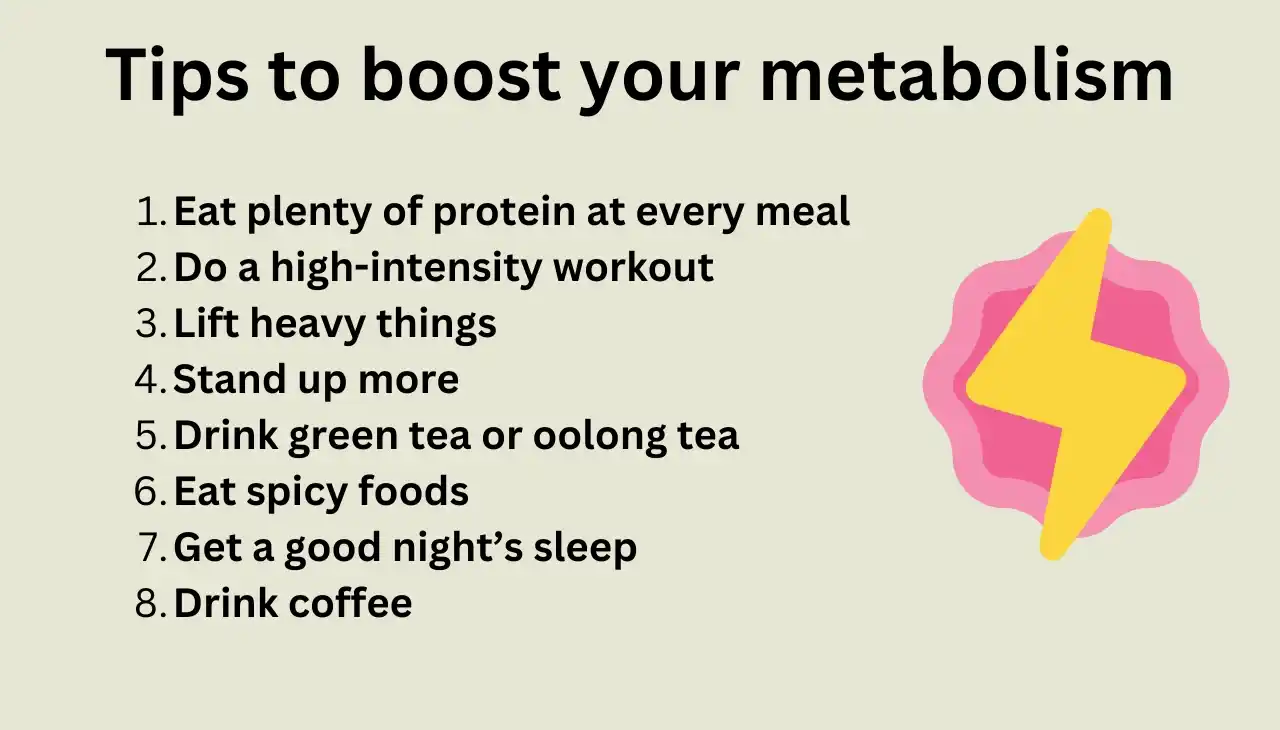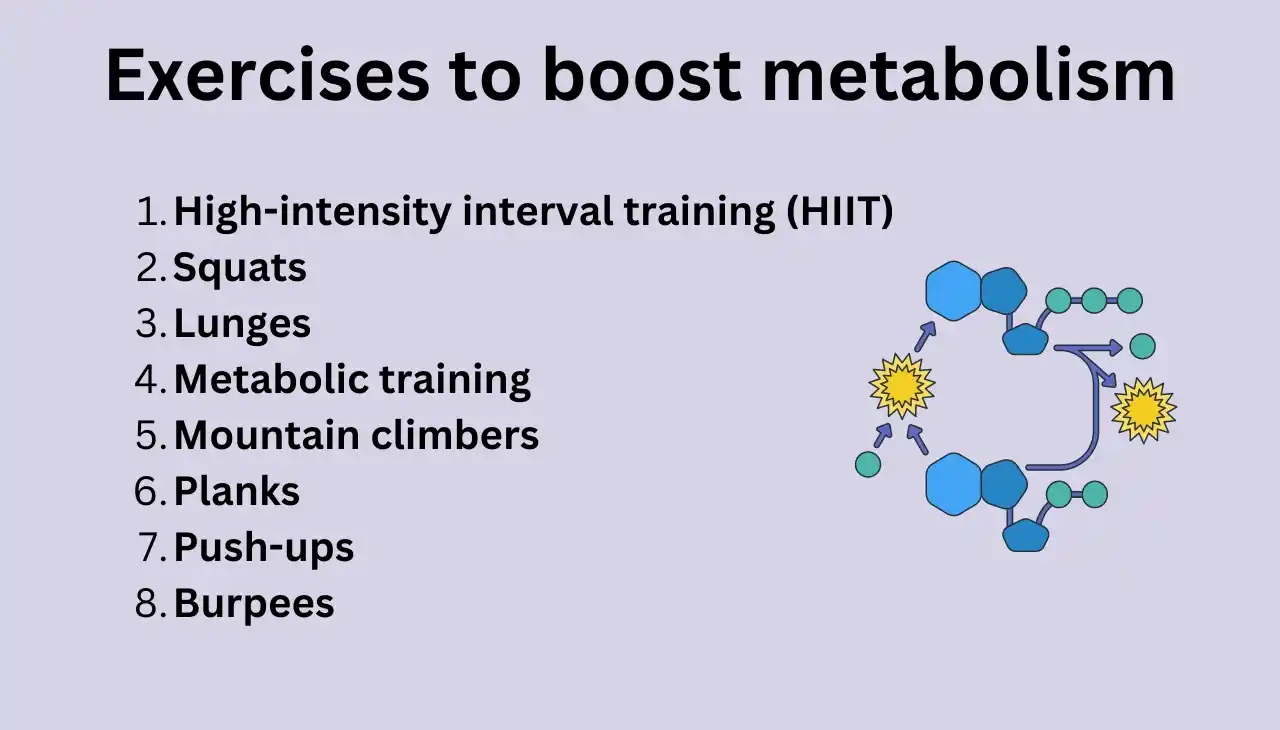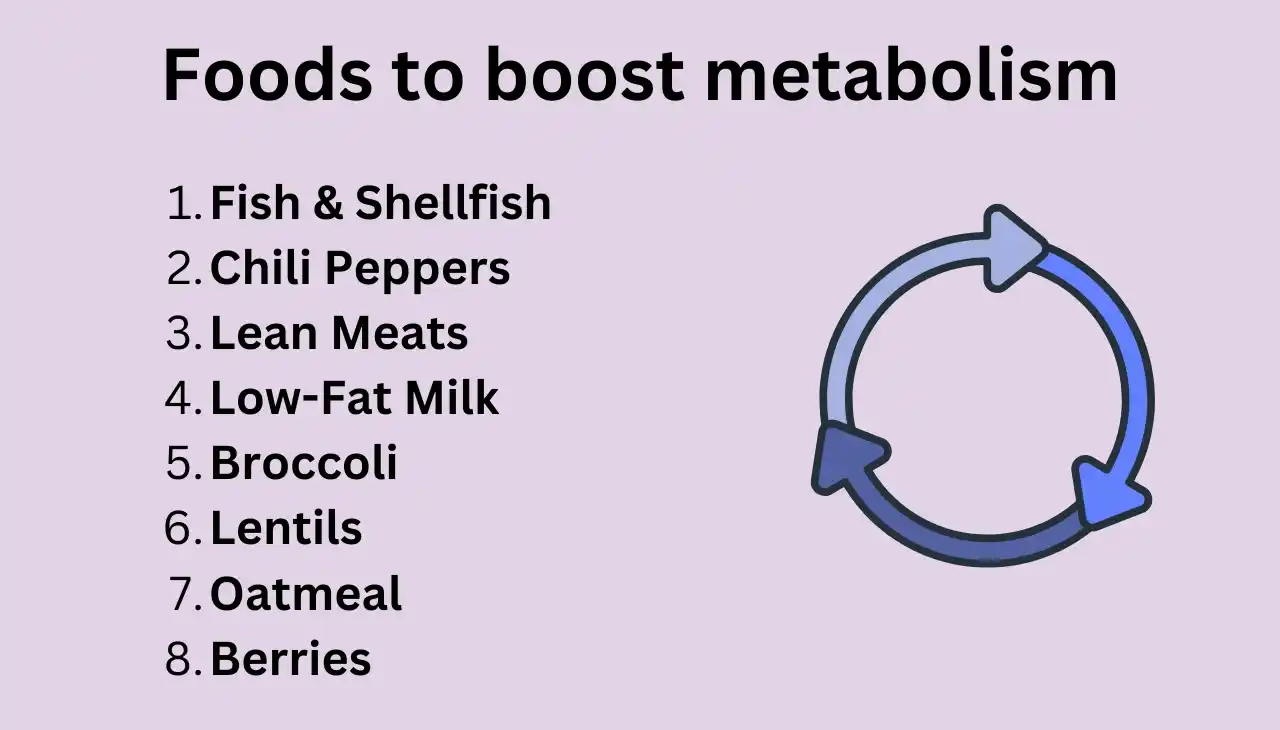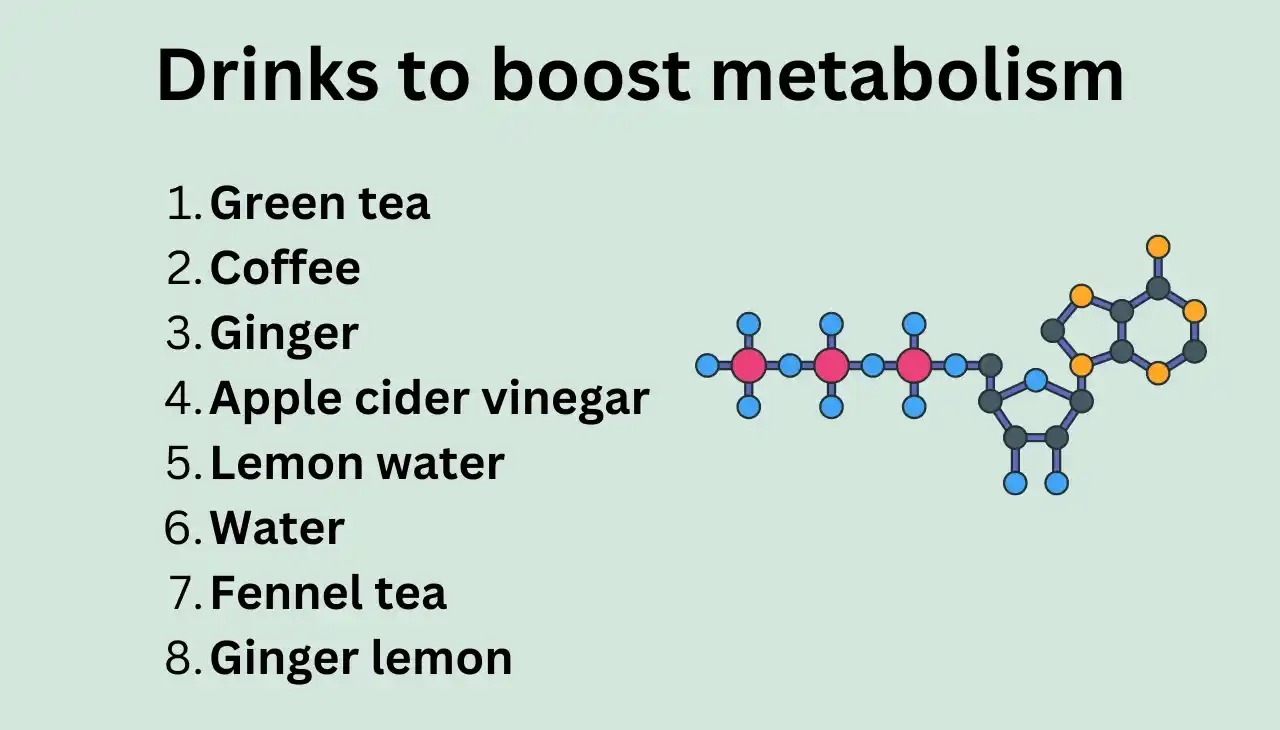Introduction
Are you looking to shed those extra pounds or simply want to feel more energetic throughout the day? The key might lie in giving your metabolism a natural boost. But what exactly is metabolism, and how can we influence it? In this comprehensive guide, we’ll explore ten surprising and effective ways to boost your metabolism, helping you achieve your fitness goals faster and more efficiently.
What is metabolism and how BMR calculated
Metabolism refers to all of the chemical processes that occur in your body to sustain life. These operations include turning food into energy, constructing and repairing tissues, and controlling a variety of body functions. Metabolism is separated into two major areas.
- Catabolism: The breakdown of molecules to obtain energy.
- Anabolism: The manufacture of all the chemicals required by cells.
Basal Metabolic Rate (BMR): Is a measure of the number of calories your body needs to perform its most basic (basal) functions, such as breathing, circulation, and cell production, while at rest. BMR accounts for the largest portion of your total daily energy expenditure (TDEE), which also includes calories burned through physical activity and digestion.
How to Calculate BMR
BMR can be estimated using the Harris-Benedict equation, which takes into account your age, sex, weight, and height:
For Men: 88.362 + (13.397 x weight in kg) + (4.799 x height in cm) – (5.677 x age in years)
For Women: 447.593 + (9.247 x weight in kg) + (3.098 x height in cm) – (4.330 x age in years)
Factors Influencing BMR
Several factors can influence your BMR, including:
- Age: BMR decreases with age.
- Sex: Men tend to have a greater BMR than women.
- Body Composition: More muscle mass increases BMR.
- Genetics: Some people naturally have a higher or lower Basal Metabolic Rate (BMR).
- Hormonal Levels: Thyroid hormones, for example, play a significant role in regulating BMR.
Understanding your BMR can help you control your weight by understanding how many calories you require to maintain, lose, or gain weight.

What is 222 method in metabolism
The 2-2-2 Method for boosting metabolism, developed by Dr. Ian Smith, is a structured approach that combines dietary changes, intermittent fasting, and high-intensity interval training (HIIT) to enhance metabolic flexibility and promote weight loss. Here’s a breakdown of the method:
- Two Meals with Carbs and Protein: For the first two weeks, focus on eating two meals a day that include both carbohydrates and protein. This helps to stabilize blood sugar levels and provide sustained energy.
- Alternating Keto and Carb-Loading Days: In the following weeks, alternate between keto days (high-fat, low-carb) and carb-loading days (higher carb intake). This alternation aims to increase metabolic flexibility, allowing your body to efficiently burn both fats and carbs.
- Intermittent Fasting: Incorporate intermittent fasting into your routine. For example, you might follow a 14-hour fast with a 10-hour eating window.
- High-Intensity Interval Training (HIIT): Include High-Intensity Interval Training (HIIT) workouts in your exercise routine. These short bursts of intense activity followed by rest periods can significantly boost your metabolic rate.
- Journaling and Weekly Weigh-Ins: Keep a journal to track your progress and weigh yourself once a week to monitor changes1.
This method is designed to help break through weight loss plateaus and enhance overall metabolic function. However, it’s important to consult with a healthcare professional before starting any new diet or exercise program to ensure it’s suitable for your individual needs.
Food that increase metabolism and burn fat
There are several foods known to boost metabolism and help burn fat.
- Green Tea: Contains caffeine and catechins, which can enhance metabolism.
- Coffee: The caffeine in coffee can increase your metabolic rate.
- Apple Cider Vinegar: It contains acetic acid, which may aid with fat loss.
- Chicken: Rich in selenium, which supports thyroid function and metabolism.
- Whey Protein: Helps build lean muscle, which can increase your metabolic rate.
- Olive Oil: Contains oleocanthal and monounsaturated fatty acids (MUFAs) that can boost metabolism.
- Coconut Oil: Rich in medium-chain triglycerides (MCTs), which can increase calorie burning.
- Oatmeal: High in soluble and insoluble fiber, which can aid in fat loss.
- Chili Peppers: Contain capsaicin, which can boost metabolism and reduce appetite.
- Ginger: Contains shogaols and zingerone, which can enhance metabolic rate.
- Cinnamon: Contains cinnamaldehyde, which may help increase metabolism.
- Salmon and Fatty Fish: Rich in omega-3 fatty acids, which can help burn fat.
- Eggs: High in protein, which can increase the thermic effect of food (TEF) and boost metabolism.
- Beans and Legumes: High in protein and fiber, which can support fat loss.
Incorporating these foods into a balanced diet, along with regular exercise, can help you achieve your health and fitness goals.
Supplements to boost your metabolism
Here are some supplements that can help boost your metabolism:
- B Vitamins: These are necessary for turning food into energy. They contribute to the metabolism of carbohydrates, proteins, and lipids.
- Vitamin D: Adequate levels of vitamin D are crucial for a healthy metabolism and can also support weight loss.
- Iron: This mineral is necessary for carrying oxygen to your muscles, which helps them burn fat.
- Magnesium: Important for energy production and muscle function.
- Green Tea Extract: Contains catechins and caffeine, which can help increase metabolism and fat burning.
- Capsaicin: Found in chili peppers, it can boost your metabolic rate and help reduce appetite.
- Calcium: Plays a role in fat metabolism and can enhance weight loss when combined with a healthy diet.
Incorporating these supplements into your routine, along with a balanced diet and regular exercise, can help you achieve your metabolism-boosting goals.

Speed up your metabolism naturally
Speeding up your metabolism naturally involves making some lifestyle and dietary changes. Here are some effective strategies:
- Eat Plenty of Protein: Consuming protein-rich foods can temporarily boost your metabolism through the thermic effect of food (TEF), which is the energy required to digest, absorb, and process nutrients.
- Engage in High-Intensity Interval Training (HIIT): HIIT involves short bursts of intense activity followed by rest periods. This type of exercise can increase your metabolic rate even after the workout is finished.
- Lift Weights: Building muscle can help increase your metabolism since muscle tissue burns more calories at rest compared to fat tissue.
- Keep on the move all day long: Say no to long periods of sitting! Try to stand up and move around regularly to keep your metabolism active.
- Drink Green Tea or Oolong Tea: These teas can increase your metabolism by 4-5% and help convert stored fat into free fatty acids, increasing fat burning.
- Eat Spicy Foods: Foods containing capsaicin, like chili peppers, can boost your metabolism and help you burn more calories.
- Get Enough Sleep: Poor sleep can impair your metabolism and raise your risk of weight gain.
- Drink Coffee: The caffeine in coffee can boost your metabolism by 3-11% and increase fat burning.
- Stay Hydrated: Drinking water can temporarily boost your metabolism by 10-30% for about an hour.
- Eat Small, Frequent Meals: Stay energized by fueling up with small meals every 3-4 hours to keep your metabolism fired up all day long!
Incorporating these habits into your daily routine can help you naturally boost your metabolism.
Metabolism booster foods
- Protein-Rich Foods: Lean meats, cheese, seafood, lentils, beans, and eggs. Protein demands more energy to process, which raises your metabolic rate.
- Green Tea: Contains catechins and caffeine, which can enhance metabolism.
- Coffee: The caffeine in coffee can boost your metabolism by 3-11%.
- Chili Peppers: Contain capsaicin, which can increase calorie burning and reduce appetite.
- Ginger: Can enhance metabolic rate and aid in digestion.
- Coconut Oil: Rich in medium-chain triglycerides (MCTs), which can increase calorie burning.
- Seaweed: High in iodine, which promotes thyroid function and metabolism.
- Flaxseeds: Contain protein, fiber, and omega-3 fatty acids, which can boost metabolism.
- Lentils: High in protein and fiber, which can support metabolic health.
- Broccoli: Rich in calcium and vitamin C, which can help boost metabolism.
Incorporating these foods into your diet, along with regular exercise and healthy lifestyle habits, can help you achieve your metabolism-boosting goals.

Drinks that speed up your metabolism
Here are some drinks that can help speed up your metabolism:
- Green Tea: Packed with antioxidants called catechins, green tea can significantly boost your metabolic rate and aid in fat burning.
- Coffee: The caffeine in coffee can increase your metabolism by 3-11% and enhance fat burning.
- Oolong Tea: This traditional Chinese tea combines the benefits of green and black tea, helping to increase energy expenditure and fat oxidation.
- Apple Cider Vinegar: Known for its various health benefits, apple cider vinegar can help speed up your metabolism and support weight management.
- Water: Staying hydrated is crucial for a healthy metabolism. Drinking water can temporarily boost your metabolism by 10-30% for about an hour.
- Black Tea: Rich in polyphenols, black tea can help improve gut health and boost metabolism.
- Protein Shakes: High-protein drinks can increase your metabolic rate and promote fullness, helping with weight management.
Incorporating these drinks into your daily routine, along with a balanced diet and regular exercise, can help you achieve your metabolism-boosting goals.
Increase your metabolism rate permanently
Increasing your metabolism rate permanently involves making consistent lifestyle and dietary changes. Here are some effective strategies:
- Build Muscle: Muscle tissue consumes more calories than fat tissue, even while at rest. Strength training routines can help you gain and maintain muscle mass.
- Stay Active: Regular physical activity, including both aerobic exercises (like walking, running, and swimming) and anaerobic exercises (like weight lifting), can boost your metabolism.
- Eat Protein-Rich Foods: Consuming protein can increase your metabolic rate for a few hours due to the thermic effect of food (TEF). Include protein in every meal to keep your metabolism active.
- Drink Water: Drinking water can temporarily boost your metabolism by 10-30% for about an hour. Keeping your body hydrated is crucial for maintaining a healthy metabolism.
- Get Enough Sleep: Poor sleep can impair your metabolism and raise your risk of weight gain. Make sure to get a solid 7-9 hours of quality sleep each night!
- Eat Small, Frequent Meals: Stay energized by fueling up with small meals every 3-4 hours to keep your metabolism fired up all day long!
- Drink Green Tea or Coffee: Both green tea and coffee contain compounds that can boost your metabolism and increase fat burning.
- Avoid Long Periods of Sitting: Try to stand up and move around regularly to keep your metabolism active.
- Eat Spicy Foods: Foods containing capsaicin, like chili peppers, can boost your metabolism and help you burn more calories.
- Manage Stress: Chronic stress might impair your metabolism. Practice stress-relieving hobbies such as meditation, yoga, or deep breathing.
Incorporating these habits into your daily routine can help you achieve a higher metabolic rate permanently.
Increase your metabolism without exercise
Increasing your metabolism without exercise is possible by making some lifestyle and dietary changes. Here are some effective strategies:
- Eat Protein-Rich Foods: Consuming protein can increase your metabolic rate due to the thermic effect of food (TEF), which is the energy required to digest, absorb, and process nutrients. Include protein in every meal to keep your metabolism active.
- Drink Green Tea or Coffee: Both green tea and coffee contain compounds that can boost your metabolism and increase fat burning.
- Stay Hydrated: Drinking water can temporarily boost your metabolism by 10-30% for about an hour. Keeping your body hydrated is crucial for maintaining a healthy metabolism.
- Eat Small, Frequent Meals: Stay energized by fueling up with small meals every 3-4 hours to keep your metabolism fired up all day long!
- Eat Spicy Foods: Foods containing capsaicin, like chili peppers, can boost your metabolism and help you burn more calories.
- Get Enough Sleep: Poor sleep can impair your metabolism and raise your risk of weight gain. Make sure to get a solid 7-9 hours of quality sleep each night!
- Manage Stress: Chronic stress can negatively impact your metabolism. Practice stress-relieving hobbies such as meditation, hot yoga, yoga, or deep breathing.
- Use Coconut Oil: Coconut oil is rich in medium-chain triglycerides (MCTs), which can increase calorie burning compared to other fats.
- Try Intermittent Fasting: This eating pattern involves cycling between periods of eating and fasting, which can help boost your metabolism.
Incorporating these habits into your daily routine can help you achieve a higher metabolic rate without the need for exercise.

Foods that speed up female metabolism
Here are some foods that can help speed up metabolism, particularly beneficial for women:
- Protein-Rich Foods: Lean meats, fish, beans, dairy products, eggs, and lentils. Protein demands more energy to process, which raises your metabolic rate.
- Green Tea: Contains catechins and caffeine, which can enhance metabolism.
- Coffee: The caffeine in coffee can boost your metabolism by 3-11%.
- Chili Peppers: Contain capsaicin, which can increase calorie burning and reduce appetite.
- Ginger: Can enhance metabolic rate and aid in digestion.
- Coconut Oil: Rich in medium-chain triglycerides (MCTs), which can increase calorie burning.
- Seaweed: High in iodine, which promotes thyroid function and metabolism.
- Flaxseeds: Contain protein, fiber, and omega-3 fatty acids, which can boost metabolism.
- Lentils: High in protein and fiber, which can support metabolic health.
- Broccoli: Rich in calcium and vitamin C, which can help boost metabolism.
Incorporating these foods into your diet, along with regular exercise and healthy lifestyle habits, can help you achieve your metabolism-boosting goals.
Tips to boost your metabolism
- Fueling Your Body with Protein: The Metabolism Booster
- Protein boosts metabolism due to its higher thermic effect of food (TEF) compared to fats and carbohydrates.
- The body burns about 20-30% of the calories in protein during digestion, compared to 5-10% for carbs and 0-3% for fats.
- Protein-rich foods make the body work harder, burning more calories.
- Recommended protein sources include lean meats, fish, eggs, Greek yogurt, legumes, and tofu and tempeh.
- Incorporating protein in every meal helps boost metabolism and reduces snacking temptations.
- Don’t Skip Meals: The Importance of Consistent Eating
- The myth of meal skipping: Skipping meals can slow metabolism and lead to weight loss.
- Regular meals keep metabolism running by signaling food availability.
- Tips for maintaining a consistent eating schedule: Plan meals in advance, prepare healthy snacks, set reminders, aim for 3 main meals and 2 small snacks daily.
- Balance of proteins, complex carbohydrates, and healthy fats is crucial for stable metabolism and energy levels.
- Stay Hydrated: A Key to Metabolism
- Making sure you stay well-hydrated is essential for keeping your metabolism running at its best
- Drinking cold water can temporarily boost metabolism by warming it to body temperature, burning extra calories.
- Make sure to drink at least 8 glasses of water every day, which is about 2 liters!
- Tips to stay hydrated include keeping a water bottle, setting reminders on your phone, flavoring water with fresh fruits or herbs, and eating water-rich foods.
- Keeping your body well-hydrated is crucial for maintaining good health and feeling your best.

- HIIT: The Ultimate Metabolic Booster
- High-Intensity Interval Training (HIIT) is a workout style that alternates between short bursts of intense exercise and periods of rest or lower-intensity exercise.
- High-Intensity Interval Training (HIIT) is well-known for its metabolism-boosting properties.
- The “afterburn effect” or Excess Post-Exercise Oxygen Consumption (EPOC) is a significant benefit of HIIT.
- A simple home HIIT workout routine includes 30 seconds of jumping jacks, 30 seconds of mountain climbers, 30 seconds of burpees, and 30 seconds of rest.
- Building Muscle and Boosting Metabolism: The Power of Strength Training
- Muscle is a key metabolic powerhouse, burning calories even at rest.
- Strength training exercises for beginners include bodyweight squats, push-ups, lunges, plank holds, and dumbbell rows.
- Aim to do strength training exercises at least twice a week, focusing on all major muscle groups.
- Tea Time: The Power of Green and Oolong Tea
- Green and oolong teas contain catechins, enhancing fat burning and increasing metabolic rate.
- Incorporating more tea into your routine can be beneficial.
- Green tea can be used as a breakfast alternative, an afternoon pick-me-up, a refreshing drink, or a base for smoothies.
- Tea is not a magic solution, but the best part of a balanced diet and healthy lifestyle.
- Spice It Up: The Metabolic Benefits of Heat
- Capsaicin, the compound in chili peppers, boosts metabolic rate and increases fat burning.
- Incorporating more spice into meals can include adding cayenne pepper to eggs, sprinkled red pepper flakes on pizza or pasta, trying spicy curry for dinner, and snacking on spicy roasted chickpeas.
- Start slow to avoid overwhelming the palate or digestive system.
- Sleep-Metabolism Connection
- Quality sleep is crucial for a healthy metabolism.
- Lack of sleep can disrupt hormone balance, leading to increased hunger and slower metabolism.
- Tips for better sleep include consistent sleep schedule, relaxing bedtime routine, cool, dark, quiet bedroom, avoiding screens, and limiting caffeine and alcohol.
- Make sure to get a solid 7-9 hours of quality sleep each night!
- Stress-Metabolism Connection
- Chronic stress can slow metabolism by releasing cortisol, a hormone that increases appetite and slows fat burning.
- Stress management techniques include mindfulness meditation, deep breathing exercises, regular physical activity, spending time in nature, and connecting with loved ones.
- Remember: Taking care of your stress is crucial for your well-being and overall happiness.

- Unsung Heroes of Metabolism: Vitamins and Minerals
Key Nutrients for Metabolic Health
- B vitamins are crucial for energy metabolism.
Foods Rich in Metabolism-Boosting Nutrients
- Whole grains, leafy greens, nuts and seeds, lean meats, and fish are nutrient-dense.
- Remember to chat with a healthcare provider before thinking about using supplements.
Holistic Approach to Boosting Metabolism
- Incorporate multiple strategies into lifestyle.
- Include protein, consistent eating, hydration, HIIT workouts, strength training, green and oolong tea, spiced meals, quality sleep, stress management, and essential vitamins and minerals.
Conclusion:
Boosting your metabolism isn’t about quick fixes or fad diets. It’s about making sustainable lifestyle changes that support your body’s natural energy-burning processes. By incorporating these strategies into your daily routine, you’re not just working towards a faster metabolism – you’re investing in your overall health and well-being.
Metabolic rate changes in the body can take time, so it’s important to be patient and focus on consistency. By incorporating strategies like boosting metabolism, building healthy habits, and incorporating more, you can achieve a healthier, more energetic body over time.
FAQ:
How long would it take to notice effects from improving my metabolism?
The time it takes to see results can vary depending on individual factors such as your current health status, diet, and activity level. Generally, you may start noticing small changes in energy levels and appetite within a few weeks of implementing these strategies. However, significant changes in weight or body composition typically take 6-8 weeks or longer to become noticeable. Remember, consistency is key! Stick to your new routines, and you'll notice the effects in time.
Can certain medical conditions affect my metabolism?
Yes, several medical conditions can impact your metabolism. Thyroid disorders (both hyperthyroidism and hypothyroidism) directly affect metabolic rate. Other conditions like diabetes, polycystic ovary syndrome (PCOS), and Cushing's syndrome can also influence metabolism. If you suspect a medical condition might be affecting your metabolism, it's important to consult with a healthcare professional for proper diagnosis and treatment.
I'm vegetarian/vegan. How can I ensure I'm getting enough protein to boost my metabolism?
Great question! Plant-based diets can absolutely provide enough protein to support a healthy metabolism. Focus on incorporating a variety of protein-rich plant foods such as: Legumes (lentils, beans, chickpeas), Quinoa and other whole grains, Nuts and seeds, Tofu, tempeh, and seitan, Plant-based protein powders (pea, hemp, or rice protein). Aim to incorporate a protein source in every snack and meal. If you're concerned about your protein intake, consider consulting a registered dietitian who specializes in plant-based nutrition for personalized advice.
Is it true that eating late at night slows down your metabolism?
This is a common myth, but the truth is a bit more nuanced. Your metabolism doesn't slow down simply because it's nighttime. What matters more is your overall calorie intake and the quality of the food you're eating. However, late-night eating can indirectly affect your metabolism if it disrupts your sleep or leads to overeating. If you're hungry late at night, it's okay to have a small, nutritious snack. Just be mindful of portion sizes and try to avoid heavy, high-calorie foods close to bedtime, as these can disrupt your sleep quality, which in turn can affect your metabolism.
Can drinking cold water really boost your metabolism?
While drinking cold water does have a small effect on metabolism, it's not significant enough to rely on for weight loss. When you drink cold water, your body does use energy to warm it to body temperature, which results in a slight increase in calories burned. However, this effect is temporary and minimal – about 4-7 calories for a glass of cold water. That said, staying well-hydrated is crucial for overall health and can support your metabolism indirectly. Proper hydration helps your body function optimally, including maintaining a healthy metabolic rate. So while you shouldn't count on cold water as a major metabolism booster, do make sure you're drinking enough water throughout the day for overall health and well-being.




